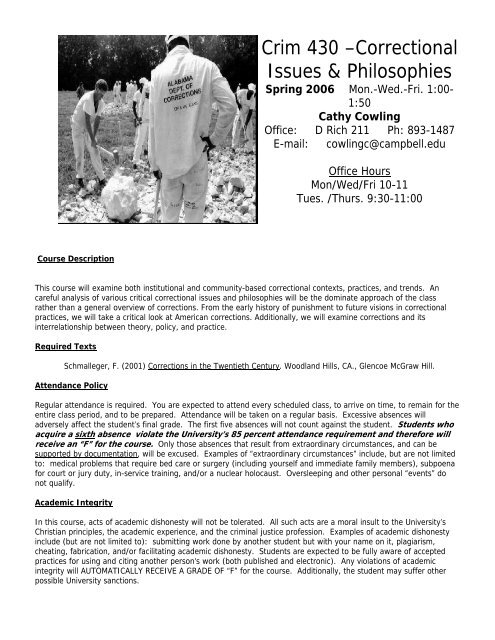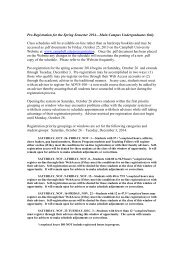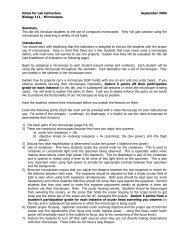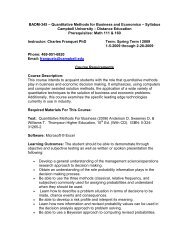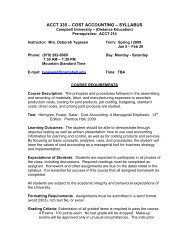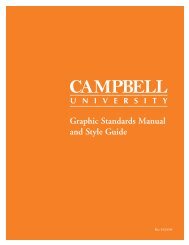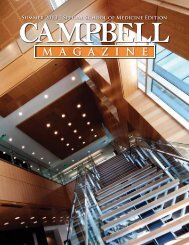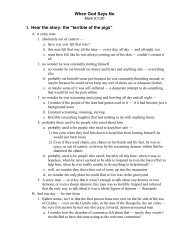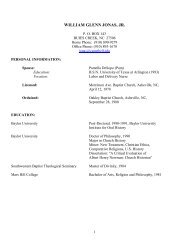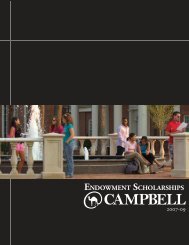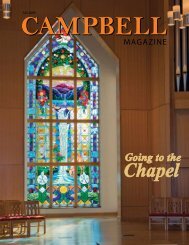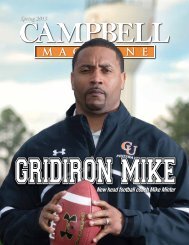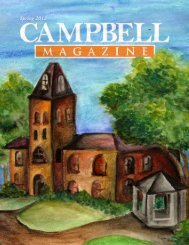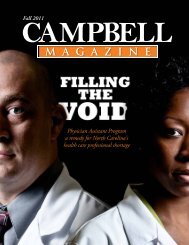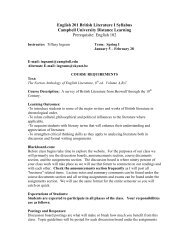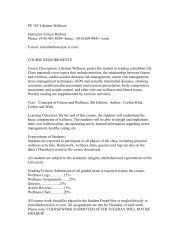Corrections (pdf) - Campbell University
Corrections (pdf) - Campbell University
Corrections (pdf) - Campbell University
Create successful ePaper yourself
Turn your PDF publications into a flip-book with our unique Google optimized e-Paper software.
Crim 430 –Correctional<br />
Issues & Philosophies<br />
Spring 2006 Mon.-Wed.-Fri. 1:00-<br />
1:50<br />
Cathy Cowling<br />
Office: D Rich 211 Ph: 893-1487<br />
E-mail: cowlingc@campbell.edu<br />
Office Hours<br />
Mon/Wed/Fri 10-11<br />
Tues. /Thurs. 9:30-11:00<br />
Course Description<br />
This course will examine both institutional and community-based correctional contexts, practices, and trends. An<br />
careful analysis of various critical correctional issues and philosophies will be the dominate approach of the class<br />
rather than a general overview of corrections. From the early history of punishment to future visions in correctional<br />
practices, we will take a critical look at American corrections. Additionally, we will examine corrections and its<br />
interrelationship between theory, policy, and practice.<br />
Required Texts<br />
Schmalleger, F. (2001) <strong>Corrections</strong> in the Twentieth Century. Woodland Hills, CA., Glencoe McGraw Hill.<br />
Attendance Policy<br />
Regular attendance is required. You are expected to attend every scheduled class, to arrive on time, to remain for the<br />
entire class period, and to be prepared. Attendance will be taken on a regular basis. Excessive absences will<br />
adversely affect the student’s final grade. The first five absences will not count against the student. Students who<br />
acquire a sixth absence violate the <strong>University</strong>’s 85 percent attendance requirement and therefore will<br />
receive an “F” for the course. Only those absences that result from extraordinary circumstances, and can be<br />
supported by documentation, will be excused. Examples of “extraordinary circumstances” include, but are not limited<br />
to: medical problems that require bed care or surgery (including yourself and immediate family members), subpoena<br />
for court or jury duty, in-service training, and/or a nuclear holocaust. Oversleeping and other personal “events” do<br />
not qualify.<br />
Academic Integrity<br />
In this course, acts of academic dishonesty will not be tolerated. All such acts are a moral insult to the <strong>University</strong>’s<br />
Christian principles, the academic experience, and the criminal justice profession. Examples of academic dishonesty<br />
include (but are not limited to): submitting work done by another student but with your name on it, plagiarism,<br />
cheating, fabrication, and/or facilitating academic dishonesty. Students are expected to be fully aware of accepted<br />
practices for using and citing another person's work (both published and electronic). Any violations of academic<br />
integrity will AUTOMATICALLY RECEIVE A GRADE OF “F” for the course. Additionally, the student may suffer other<br />
possible <strong>University</strong> sanctions.
Crim 430 Syllabus Page 2<br />
Perhaps the most common forms of academic dishonesty are plagiarism and collaboration. Let me clarify both, so that<br />
you do not unwittingly go astray. Plagiarism is the appropriation of the words, works, comments, ideas or other<br />
intellectual property of a third party without giving credit to that party. It most often occurs in term papers and other<br />
written assignments. Plagiarism does not have to be a word-for-word “copying” of someone else’s writing or “cut and<br />
paste” of electronic material; most cases, in fact, involve the use of a third party’s idea in the writer’s own word,<br />
where an effort has been made to make the reader believe that the idea originated with the writer him or herself.<br />
There are two important rules to remember in order to avoid plagiarism: (1) only “common knowledge” statements<br />
need not be cited in your work [e.g., Washington was the first president, the Civil War ended in 1865, the FBI is in the<br />
Justice Department, etc.], and (2) if in doubt as to whether to cite a source, cite it—better safe than sorry!<br />
As for collaboration on assignments, keep the following rules in mind: (1) unless specifically authorized by me, you<br />
are not to seek, provide or in any way accept outside assistance from a third party in preparing graded assignments in<br />
this class. This rule does not apply to studying for exams, which you may do in groups; it is also not to be construed<br />
to deny you the assistance of library staff in finding research materials in the library or on the web (finding, not<br />
reading or interpreting, which you must do on your own!). (2) You may not turn in any work for grading in this class<br />
that is wholly or substantially the product of work submitted for a grade in another class, nor may you turn in such<br />
work in another class that is the product of work for this class without prior permission from me and the other<br />
instructor(s) involved. (3) You must take exams and other assigned in-class work with a vow of confidentiality—you<br />
will not at any time discuss or divulge the material contained on such exams with any other person for any reason<br />
until such time as grades are posted for the assignment. (4) Do not inadvertently leave your work on a publicly<br />
accessible computer (i.e., upon completion of your work, remove the file(s) from the hard dive and memory before<br />
releasing the machine for another person’s use).<br />
Class Norms and Professional Culture<br />
• The content of this course and conduct of this instructor seek to fulfill the <strong>University</strong>’s purpose and mission as<br />
outlined on pages 19-20 of the <strong>Campbell</strong> <strong>University</strong> Bulletin including: helping students develop an integrated<br />
Christian personality and world view, critical judgment, and an appreciation of our intellectual, cultural, and<br />
religious heritage.<br />
• Students must be in their seats by the time class starts. Anyone arriving more than 15 minutes after the<br />
scheduled start of class will be counted absent. If the instructor does not arrive within 10 minutes of the<br />
scheduled time for class to begin, the class may be dismissed.<br />
• Please inform your instructor if you are challenged by a learning or physical disability and need special<br />
accommodations.<br />
• Handouts, returned tests, and assignments will be brought to class and distributed only once. Students who miss<br />
such items must come by my office and pick them up.<br />
• Due to Family Educational Privacy Act requirements, grades will not be posted, given out over the phone, or<br />
released to anyone other than the student.<br />
• Unless otherwise stated in class, there are no extra credit assignments for this class.<br />
• As for due dates and times, the rule is singularly simple: when due dates are given in class or posted on the<br />
attached agenda, the assignment is due on that date, no later than the ending time for the class. If you’re so<br />
much as one minute late in submitting it, it will be considered a day late. Then, for each 24-hour period after that<br />
time, additional day-late penalties apply. The standard penalty for late assignments is 10 points (i.e., one letter<br />
grade) per day late, up to a maximum of 3 days. The instructor reserves the right to refuse any assignment<br />
turned in more than three days late. In extraordinary cases, the instructor reserves the right to waive all or part<br />
of the late penalty to be assessed against any given submission.<br />
• Opinions, counterpoints, and the contributions of other class members will be respected at all times.
Crim 430 Syllabus Page 3<br />
• There is no such thing as a “stupid question” in this class (except, maybe, for asking about the Braves’ pennant<br />
chances while the rest of us are talking about some salient point in the text!). Asking questions and raising issues<br />
is the way we all learn. I expect us all to act as learning adults who have enough respect for each other to<br />
entertain a diversity of questions, comments or points of view. To this extent, the walls of this classroom during<br />
our meeting times mark the boundaries of an inviolable intellectual haven—you should, at all times, feel safe and<br />
comfortable to participate in class discussions. If for some reason you do not, you should see me confidentially at<br />
your convenience to discuss how I might rectify the problem.<br />
• Respect and courtesy will be shown by actively listing when others are talking and refraining from “chit-chatting”<br />
on the side.<br />
• Inappropriate comments or jokes based on sex, color, and/or religion will not be tolerated.<br />
• Students are expected to dress and act professionally when visiting any criminal justice agency.<br />
• Assignments will be graded on accuracy, depth of expression, grammar, neatness, punctuation, quality, spelling,<br />
and thoroughness. See attached guidelines for paper submission specifications and technical requirements.<br />
Remember, learning an appropriate and technical style for writing formal papers is part of the experience of<br />
becoming an educated person.<br />
• Cell phones & pagers MUST NOT disrupt class. Taping lectures may only be done with instructor permission.<br />
• YOU are responsible for your own learning! This is work! It will require some sacrifice on your part if you are to<br />
succeed. You have bought an opportunity to learn something, not a service. It is not social entertainment for the<br />
useless and unemployable. YOU have an obligation to apply yourself to the task of mastering the material before<br />
you and to get something useful and interesting from this course. YOU are responsible for asking questions if you<br />
do not understand any information presented.<br />
• <strong>Campbell</strong> is blessed with some remarkable resources for assisting students, including the Writing Center, the<br />
Counseling Center and the faculty itself. You are strongly encouraged to get the most out of your tuition dollar<br />
whenever you feel need of it by using these resources. I hope you will think of me as the first stop in that chain.<br />
If you need help with this class, please come see me. During office hours, you do not need an appointment; drop<br />
by visits are on a first-come-first served basis. If my office hours are not convenient for you, please make an<br />
appointment to see me at a mutually agreeable time.<br />
• The use of tobacco products in class is prohibited.
• Course Requirements and Grading Policy<br />
The following grading scale will be used in this class in determining your final course grade:<br />
A = 100—90 B = 89—80 C = 79—70 D = 69—60 F = 59 or below<br />
Your grade in this course will be based on the following three components:<br />
Examinations (2 @ 30 percent each for a total of 60 percent of the final grade)<br />
Exams will be administered ONLY on the dates scheduled on the attached agenda, during the class period.<br />
In the event that the student falls victim to an “extraordinary circumstance” (see attendance policy above),<br />
and can not take the exam at the scheduled date and time, the student must personally notify the instructor<br />
of such circumstances PRIOR TO THE BEGINNING OF THE EXAM, otherwise an “F” will be given. The<br />
burden of documented proof for excused absences rests wholly with the student.<br />
Make-up exams will be given only in the case of an approved absence and may constitute a different format<br />
from that of the scheduled examination.<br />
Exams will cover ALL material included in lectures, the textbook, films shown in class, outside readings<br />
assigned, guest lectures, etc.<br />
Participation (20 percent)<br />
Students will be expected to come prepared to discuss and critically assess daily assigned readings. Using the<br />
Socratic method, students will be asked questions that probe their critical assessment of the reading(s).<br />
Student Project (20 percent of final grade)<br />
This is a student initiated and self-designed project that highlights any aspect of corrections that is of interest<br />
to the student. Examples might include:<br />
7 Obtaining literature for each class member and doing a PowerPoint presentation on Prison Fellowship<br />
Ministries<br />
7 Find a former inmate and arrange for him/her to speak with a Q&A to follow.<br />
7 Put together an overview of prisons in NC: locations, level of security, number & type of inmates,<br />
average time served, etc.<br />
7 Formal term paper (if you choose this, be sure to see the paper specification that follow on pages 6-7)<br />
In short, you can choose any topic you are interested in and present it to the class (be sure each class<br />
member receives a copy of your presentation material). Proposed topics due FEB 3rd. Note: no two class<br />
members may research the same topic. Projects will be due for presentation on April 21.<br />
ADDITIONAL NOTES<br />
“Students with documented disabilities who desire modifications or accommodations should<br />
contact the office of Student Support Services located in the <strong>University</strong>’s Hight House.”<br />
“All students are subject to the academic integrity and behavioral expectations of the<br />
<strong>University</strong>.”
Crim 430 Syllabus Page 5<br />
Preliminary Agenda<br />
Date Topic Chapter<br />
Readings<br />
Jan. 11 Introduction and Syllabus<br />
Jan. 13 No Class- Drop Add<br />
Jan. 16 <strong>Corrections</strong>: An Overview Chapter 1<br />
Jan. 18<br />
Jan. 20 Punishments: A Brief History Chapter 2<br />
Jan.23<br />
Jan. 25 Sentencing: To Punish or Reform Chapter 3<br />
Jan.27 NO CLASS_ MOCK TRIAL TOURNAMENT<br />
Jan. 30<br />
Feb. 1 Diversion and Probation Chapter 4<br />
Feb.3<br />
Feb. 6 Intermediate Sanctions Chapter 5<br />
Feb. 8<br />
Feb. 10 Jails: Way Stations Along the Justice Highway Chapter 6<br />
Feb. 13<br />
Feb. 15 Prisons Today Chapter 7<br />
Feb. 17<br />
Feb. 20 Parole: Early Release and Reintegration Chapter 8<br />
Feb. 22<br />
Feb. 24 The Staff World: Managing the Prison Population Chapter 9<br />
Feb. 27<br />
March 1<br />
March 3 MIDTERM EXAM<br />
March 13 The Inmate world: Living Behind Bars Chapter 10<br />
March 15<br />
March 17 The Legal World: Prisons and the Courts Chapter 11<br />
March 20<br />
March 22 Special Prison Populations Chapter 12
Crim 430 Syllabus Page 6<br />
March 24<br />
March 27 VIDEO PRESENTATION<br />
March 29 VIDEO PRESENTATION<br />
March 31 VIDEO PRESENTATION<br />
April 3 Prison Issues and Concerns Chapter 13<br />
April 5<br />
April 7 The Victim Chapter 14<br />
April 10<br />
April 12 Death: the Ultimate Sanction Chapter 15<br />
April 14<br />
April 17 Juvenile <strong>Corrections</strong>: End of an Era Chapter 16<br />
April 19<br />
April 21 Presentations<br />
Apr. 25 Presentations<br />
Apr. 27 Final Exam Review<br />
May 1 FINAL EXAM 3:00
Crim 430 Syllabus Page 7<br />
Guidelines for Written Work<br />
• Use the departmental guidelines when creating your paper. The link to those guidelines is:<br />
http://www.campbell.edu/coas/government/guide04.<strong>pdf</strong><br />
• White bond paper, neatly prepared and clean.<br />
• Double spaced, 12 point font, left justification (i.e., right margin is “jagged” or “ragged”).<br />
• One inch (1”) uniform margins at the top, bottom, right, and left of every page.<br />
• Number all pages. The cover page / title page is numbered but not counted toward total. Thus, the title page is<br />
numbered page 1.<br />
• The title page should contain the following centered on the page: your name, title of the paper, the course<br />
number (e.g., CRIM 430), and the date. Additionally, in the upper right corner you should have the Running Head<br />
and page number.<br />
• Five-space indent for the start of each new paragraph. Do not hyphenate any words at the end of lines. Let<br />
sentences naturally “wrap.”<br />
• Paragraphs must be longer than two sentences, but never longer than 80 percent of one typed page. Do NOT<br />
triple space (i.e., create white space or extra space) between paragraphs.<br />
• Watch for orphans at the end or beginning of each page.<br />
• Use the APA (American Psychological Association) Style Manual for in-text (manuscript) and reference page<br />
citations of works used or cited (a separate handout will be distributed in class on the APA style). ANY mistakes<br />
in use of the APA style will result in an automatic one letter grade reduction.<br />
In the text (manuscript) citation<br />
APA style requires only the author’s last name and year of publication separated by a comma and enclosed by<br />
parentheses. APA does NOT use footnotes Example:<br />
One study of stress among police officers (Weisberg, 1998) shows a correlation between . . .<br />
Weisberg’s (1998) study of stress among police officers shows a correlation between . . .<br />
Reference Page (list of works cited or used)<br />
Book by single author:<br />
Peak, K. (2001). Justice administration: Police, courts, and corrections management (3 rd ed.). Upper Saddle River,<br />
NJ: Prentice Hall.<br />
Journal Article:<br />
Zimmer, L. (1990). Proactive policing against street-level drug trafficking. American Journal of Police, 9, 43-57.


